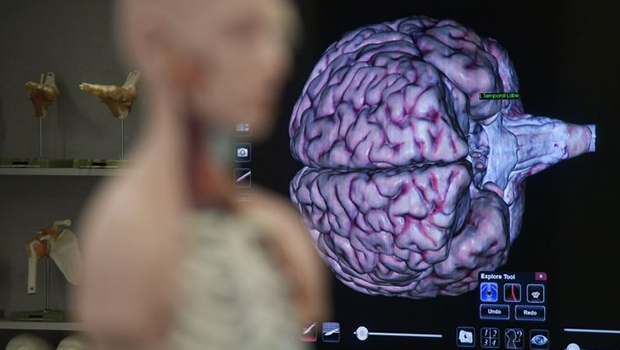
A projection of the "Anatomoage", a virtual dissection tablet, is seen during the launch of the Brain Bank Singapore, at the Lee Kong Chian School of Medicine on Nov 27, 2019. ST PHOTO: KUA CHEE SIONG
Last week, Ms Lovely Fernandez, 41, signed up to donate her brain after her death to Singapore's first brain bank, despite her family's misgivings.
"I was diagnosed with multiple sclerosis, a disease with no cure which has kept the left side of my body numb for the last 10 years. I hope by donating my brain scientists can find a cure for others," she said on Wednesday (Nov 27).
She was attending the launch of Brain Bank Singapore in Novena, which will give researchers access to Asian brain tissues, and possibly improve treatment of brain disorders here.
The $500,000 facility, located on the 11th floor of the Lee Kong Chian School of Medicine, is completely reliant on donors giving their brains post-mortem for research.
It has set an initial target of getting 1,000 people to sign up as donors within the next four years. Factoring in mortality rates, this will work out to about 20 to 30 brains making their way to the facility each year.
The brain bank is believed to be the first of its kind in South-east Asia, with similar centres already established in China, Europe and the United States.
Scientists say the bank is important as there are significant differences in the way Caucasian and Asian brains are affected by neurological disorders such as Alzheimer's and Parkinson's disease.
This means research and treatment developed in the West are not directly applicable to the Singapore context, they say.
"We now know that genetic background is very important in determining the onset and course of such disorders. It is essential that neuroscientists in Singapore have access to brain tissues from patients with the appropriate genetic and ethnic background," said Professor Richard Reynolds, the director of the new brain bank.
Previously, scientists here could rely only on imported non-Asian brain samples, animal tissues, or brain scans, all of which fell short of what researchers needed. Brain scans could not reach the molecular level with current technology, while animal tissues and non-Asian samples did not map on perfectly to Asian brain behaviour, neurologists said.
Professor Lim Kah Leong, the vice-dean of research at the school, noted that the country's Chinese, Malay and Indian donors represent huge areas of the continent. "Our research can be important not just in Singapore, but also in the region and the continent," he said.
The brain bank, which took two years to set up, is a collaboration between Nanyang Technological University, the National Neuroscience Institute (NNI) and the National Healthcare Group (NHG).
It is still in its initial stages, with efforts mostly focused on getting Singaporeans to be comfortable with donating their brains.
Small surveys on Singaporeans' attitudes to brain donation the NNI has done at its clinics have had "remarkably positive results", NNI said, with more than 50 per cent of those approached expressing a willingness to get involved.
Upon the donor's death, Prof Reynolds said the brain will be extracted within 24 hours, quick enough for bodies to be returned to the families for funeral proceedings.
Brain tissues will then be stored in a -80 deg C environment, preserving the "very precious gift" for decades, Prof Reynolds added.
Brain Bank Singapore said the brain tissues that it has collected will be anonymised, with donors' personal details kept strictly confidential.
"It will not be on the Internet, instead stored in a standalone computer accessible only by the bank director and manager," Prof Reynolds said.
Researchers who apply to use the tissues will also have to be vetted by ethics boards.
To date, three people, including Ms Fernandez, have signed up for the scheme, after the recruitment process began at clinics and community events last week.
She said: "If I die at 55 or 60, my brain will still be relatively young. Instead of my body just lying there, I would feel much more useful if it could help scientists."













 Get it on Google Play
Get it on Google Play